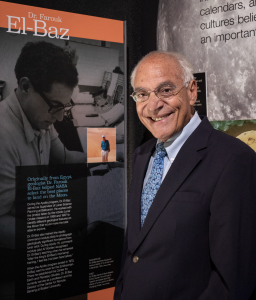
Dr. El-Baz when he visited the Museum of Flight’s APOLLO exhibit in 2017
Dr. Farouk El-Baz grew up in a small Egyptian town in the Nile Delta. He credits his curiosity with the physical world to his father. El-Baz originally came to the United States in the early 1960’s to study geology, and earned his Ph.D. from the Missouri University of Science and Technology in 1964. After that, he briefly taught at the University of Heidelberg, Germany, before returning to Egypt to search for a job as a geologist. Unable to find a job in his chosen field, El Baz immigrated to the United States in 1966 where he was hired by Bellcomm, which needed geologists to review images of the Moon being returned by the robotic Lunar Orbiter spacecraft.
During the Apollo program, Dr. El-Baz served as the supervisor of The Lunar Science Planning at Bellcomm and was Secretary General of the lunar site selection committee. He worked with the photos taken by the Lunar Orbiters in 1966 and 1967 to identify different geological features on the Moon that would make the best sites to explore.
Dr. El-Baz then went on to train the Apollo command module pilots to photograph geologically significant formations from lunar orbit. He recognized that traditional methods of geological training were not working for the astronauts, so he discovered that engaging their interest would be key to getting good geological data back from their mission. El-Baz worked to translate geologic observations into a system that would be understood by pilots. He focused on visible landmarks, which he hoped the pilots would use to get their bearings. By identifying geologic features as landmarks, he engaged the astronauts’ curiosity, and eventually their competitive natures took over. The astronauts began to work hard to see who could become the most knowledgeable about the Moon’s surface features. Apollo 15 command module pilot Al Worden recognized Dr. El-Baz’s teaching when he remarked “After the King’s (El-Baz’s nickname) training, I feel like I’ve been here before.”
El-Baz went to work for the Smithsonian when the Apollo program ended in 1972. There, he established the Center for Earth and Planetary Studies. Dr. El Baz went on to serve as a professor and the Founding Director of the Center for Remote Sensing at Boston University until his retirement in spring of 2018. Under his leadership, the Center has grown to become a leading force in the applications of remote sensing technology to environments around the world. In 1997, NASA selected it as a “Center of Excellence in Remote Sensing.”
In addition to all of his incredible scientific achievement, Dr. El-Baz has also been an advocate for clean drinking water. He has spent much of his time advising leaders all around the globe and especially on the African continent on how they can work together to decrease their people’s dependence on strained water sources while opening up new sources to relieve suffering populations.
Dr. El-Baz has won numerous awards for his work including NASA’s Apollo Achievement Award, Exceptional Scientific Achievement Medal, and Special Recognition Award, the Arab Republic of Egypt Order of Merit – First Class, and the World Water Masters Award of the International Desalination Association (IDA), among many others. El-Baz has also had appearances in popular culture, including a portrayal in the Tom Hanks-produced HBO series From the Earth to the Moon, in which he was training a group of astronauts, and in Star Trek: The Next Generation, a spaceship was featured that bore his name.
Resources:
Dr. Farouk El-Baz. Inamori International Center for Ethics and Excellence. (2020, March 30). Retrieved April 11, 2023, from https://case.edu/inamori/inamori-ethics-prize/past-prize-recipients/2018-dr-farouk-el-baz
Farouk El-Baz. Farouk El-Baz, PhD | College of Engineering. (n.d.). Retrieved April 11, 2023, from https://www.bu.edu/eng/profile/farouk-el-baz/
Nunn, G. (n.d.). Dr. Farouk El-Baz. blog.museumofflight.org. Retrieved April 11, 2023, from https://blog.museumofflight.org/dr.-farouk-el-baz